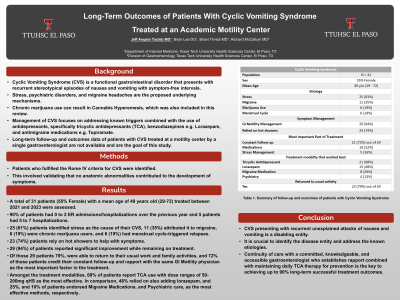Tuesday Poster Session
Category: Functional Bowel Disease
P4055 - Long-Term Outcomes of Patients With Cyclic Vomiting Syndrome Treated at an Academic Motility Center
Tuesday, October 29, 2024
10:30 AM - 4:00 PM ET
Location: Exhibit Hall E

Has Audio

Jeff Angelo Taclob, MD
Texas Tech University Health Sciences Center
Memphis, TN
Presenting Author(s)
Jeff Angelo Taclob, MD1, Brian Lee, DO2, Bhavi Trivedi, MD2, Richard W. McCallum, MD3
1Texas Tech University Health Sciences Center, Memphis, TN; 2Texas Tech University Health Sciences Center, El Paso, TX; 3Texas Tech University Health Sciences Center School of Medicine, El Paso, TX
Introduction: Cyclic Vomiting Syndrome (CVS) is a functional gastrointestinal disorder that presents with recurrent stereotypical episodes of nausea and vomiting with symptom-free intervals. The underlying mechanisms proposed are stress, psychiatric disorders, and migraine headaches. Chronic marijuana use can result in Cannabis hyperemesis, which was also included in this review. Management of CVS focuses on addressing known triggers combined with the use of antidepressants, specifically tricyclic antidepressants (TCA), benzodiazepines e.g. Lorazepam, and antimigraine medications e.g. Topiramate. Long-term follow-up and outcomes data of patients with CVS treated at a motility center by a single gastroenterologist are not available and are the goal of this study.
Methods: Patients who fulfilled the Rome IV criteria for CVS were identified. This involved validating that no anatomic abnormalities contributed to the development of symptoms.
Results: A total of 31 patients (17 women and 14 men) with a mean age of 49 years old (range 29-72) treated between 2021 and 2023 were assessed. 90% of patients had 0 to 2 ER admissions/hospitalizations over the previous year and 5 patients had 5 to 7 hospitalizations. 25 (81%) patients identified stress as the cause of their CVS, 11 (35%) attributed it to migraine, 6 (19%) were chronic marijuana users, and 6 (19%) had menstrual cycle-triggered relapses. 23 (74%) patients rely on hot showers to help with symptoms. 29 (94%) of patients reported significant improvement while remaining on treatment, 79% of those 29 patients were able to return to their usual work and family activities, and 72% of those patients credit their constant follow-up and rapport with the same GI Motility physician as the most important factor in the treatment. Amongst the treatment modalities, 66% of patients report TCA use with dose ranges of 50-200mg qHS as the most effective, while 50% relied on also adding lorazepam, and 25%, and 10% of patients endorsed Migraine Medications, and Psychiatric care, as the most effective methods, respectively.
Discussion: CVS presenting with recurrent unexplained attacks of nausea and vomiting is a disabling entity. It is crucial to identify the disease entity and address the known etiologies. Continuity of care with a committed, knowledgeable, and accessible gastroenterologist who establishes rapport combined with maintaining daily TCA therapy for prevention is the key to achieving up to 90% long-term successful treatment outcomes.
Disclosures:
Jeff Angelo Taclob, MD1, Brian Lee, DO2, Bhavi Trivedi, MD2, Richard W. McCallum, MD3. P4055 - Long-Term Outcomes of Patients With Cyclic Vomiting Syndrome Treated at an Academic Motility Center, ACG 2024 Annual Scientific Meeting Abstracts. Philadelphia, PA: American College of Gastroenterology.
1Texas Tech University Health Sciences Center, Memphis, TN; 2Texas Tech University Health Sciences Center, El Paso, TX; 3Texas Tech University Health Sciences Center School of Medicine, El Paso, TX
Introduction: Cyclic Vomiting Syndrome (CVS) is a functional gastrointestinal disorder that presents with recurrent stereotypical episodes of nausea and vomiting with symptom-free intervals. The underlying mechanisms proposed are stress, psychiatric disorders, and migraine headaches. Chronic marijuana use can result in Cannabis hyperemesis, which was also included in this review. Management of CVS focuses on addressing known triggers combined with the use of antidepressants, specifically tricyclic antidepressants (TCA), benzodiazepines e.g. Lorazepam, and antimigraine medications e.g. Topiramate. Long-term follow-up and outcomes data of patients with CVS treated at a motility center by a single gastroenterologist are not available and are the goal of this study.
Methods: Patients who fulfilled the Rome IV criteria for CVS were identified. This involved validating that no anatomic abnormalities contributed to the development of symptoms.
Results: A total of 31 patients (17 women and 14 men) with a mean age of 49 years old (range 29-72) treated between 2021 and 2023 were assessed. 90% of patients had 0 to 2 ER admissions/hospitalizations over the previous year and 5 patients had 5 to 7 hospitalizations. 25 (81%) patients identified stress as the cause of their CVS, 11 (35%) attributed it to migraine, 6 (19%) were chronic marijuana users, and 6 (19%) had menstrual cycle-triggered relapses. 23 (74%) patients rely on hot showers to help with symptoms. 29 (94%) of patients reported significant improvement while remaining on treatment, 79% of those 29 patients were able to return to their usual work and family activities, and 72% of those patients credit their constant follow-up and rapport with the same GI Motility physician as the most important factor in the treatment. Amongst the treatment modalities, 66% of patients report TCA use with dose ranges of 50-200mg qHS as the most effective, while 50% relied on also adding lorazepam, and 25%, and 10% of patients endorsed Migraine Medications, and Psychiatric care, as the most effective methods, respectively.
Discussion: CVS presenting with recurrent unexplained attacks of nausea and vomiting is a disabling entity. It is crucial to identify the disease entity and address the known etiologies. Continuity of care with a committed, knowledgeable, and accessible gastroenterologist who establishes rapport combined with maintaining daily TCA therapy for prevention is the key to achieving up to 90% long-term successful treatment outcomes.
Disclosures:
Jeff Angelo Taclob indicated no relevant financial relationships.
Brian Lee indicated no relevant financial relationships.
Bhavi Trivedi indicated no relevant financial relationships.
Richard McCallum: Evoke Pharma – Consultant.
Jeff Angelo Taclob, MD1, Brian Lee, DO2, Bhavi Trivedi, MD2, Richard W. McCallum, MD3. P4055 - Long-Term Outcomes of Patients With Cyclic Vomiting Syndrome Treated at an Academic Motility Center, ACG 2024 Annual Scientific Meeting Abstracts. Philadelphia, PA: American College of Gastroenterology.
